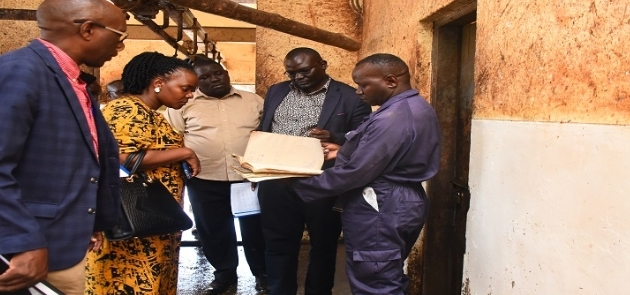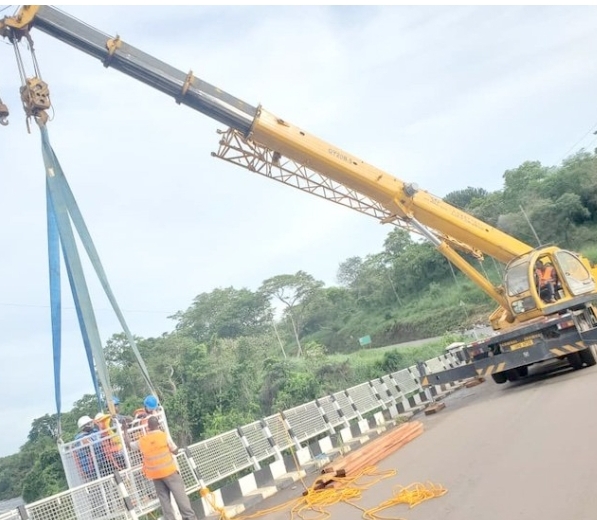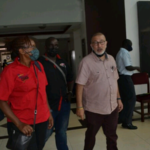Lawmakers have called the immediate closure of the abattoir in Hoima City citing unhygienic conditions which they say poses health hazards to consumers of beef and goat meat.
The slaughter house in Kiryateete East, Hoima City was condemned in 2006 but legislators on the Health Committee were perturbed to learn that the city authorities have permitted use of the facility despite its appalling state.
The Members of Parliament (MPs) made the discovery during an oversight visit to a cross section of abattoirs and slaughter houses in parts of Western Uganda on 13 and 14 May 2024.
Construction works of the new modern abattoir in Kyentale Ward, Hoima West Division stands at 85 per cent completion but the Vice Chairperson of the committee, Hon. Samuel Opio recommended that authorities find an alternative temporary space in the incomplete facility.
“What we have seen is unacceptable. A transition to the new abattoir is most desirable but the status of the condemned slaughter house almost leaves no room for transition,” said Opio.
The Hoima City Production Officer, Swaleh Kajuma said authorities cannot sanction use of the new abattoir without an operation permit from the Ministry of Agriculture, Animal Industry and Fisheries (MAAIF).
“MAAIF officials say we cannot use the facility until works are complete. As soon as we get the operation permit, we shall shift,” said Kajuma.
Hoima City Mayor, Brian Kabuya asked the lawmakers to push for expeditious issuance of a temporary operations permit, as well as ensure funds totaling Shs1 billion are allocated towards the completion of the abattoir.
“We request you to ask MAAIF to be considerate and allow a temporary permit because the major reason as to why we cannot shift is limited funding. The contractor has been waiting for funds since January and the fact is, our budget is depleted,” he said.
In Mbarara City, the MPs also recommended closure of the government owned abattoir in Kyenkombe saying the infrastructure is inadequate to continue operations.
Hon. Nicholas Kamara (FDC, Kabale Municipality) urged the Mbarara City Veterinary Officer, Dr. Moses Amanyire to ensure that the facility stays closed until acceptable infrastructure is put in place.
“It is totally unhygienic; there are flies all over and the floor is filled with stagnant blood. We have recommended that it stays closed until hygienic conditions are restored,” Kamara said.
Amanyire acknowledged that the slaughter house is in a deplorable state but he quickly blamed it on inadequate funds for renovations and maintenance.
“When we have a broken floor and leaking roof, all that affect the operations of an abattoir,” he said.
On the contrary, the MPs were impressed with the state of the privately owned abattoir in Mbarara City, saying that the facility has the appropriate infrastructure.
Amanyire however, urged the MPs to task government to revamp the government abattoirs saying that owners of private abattoirs often threaten to close their facilities due to low revenues collected.
“We need to seriously think of a better government owned city abattoir because these private owners complain and threaten to close and we do not have alternatives,” he said.
Meanwhile, MPs expressed dismay over the poor drainage system, lack of electricity, shortage of running water and a non-functional cold room in the Masaka City abattoir in Kirumba.
The Masaka City meat inspector, Peter Ssenabulya reported that whereas the facility generates Shs2.3 million monthly, funds are not availed for its improvement, saying that the facility has never got a facelift since it was constructed in 1959.
“The cold storage room is non-functional because the ceiling has fallen down. The original plan caters for slaughtering of fewer animals but now numbers have increased, hence the poor drainage. We requested for solar lighting, in vain and now we use torches,” said Ssenabulya.
Fort Portal City authorities on the other hand were commended for meeting most of the requirements of operating a slaughter house in Kibimba.
“The drainage is good because we have been to other places and the systems are blocked. We are happy to see the staff in uniform and appropriate work gear, and there is enough running water. The infrastructure inside the slaughter house is good,” said Opio.
The City Veterinary Officer, Fort Portal, Dr Stanley Busingye however raised concern over inadequate staff in the veterinary department, saying this affects inspection of slaughter houses and abattoirs.
“We have only one Veterinary officer who doubles as an inspector and yet we have four facilities. In the city, we require at least 13 staff,” said Busingye.
The Speaker, Anita Among tasked the Health Committee to ascertain the state of abattoirs in cities across the country during a sitting of the House on Tuesday, 13 February 2024.
3 total views , 1 views today

























